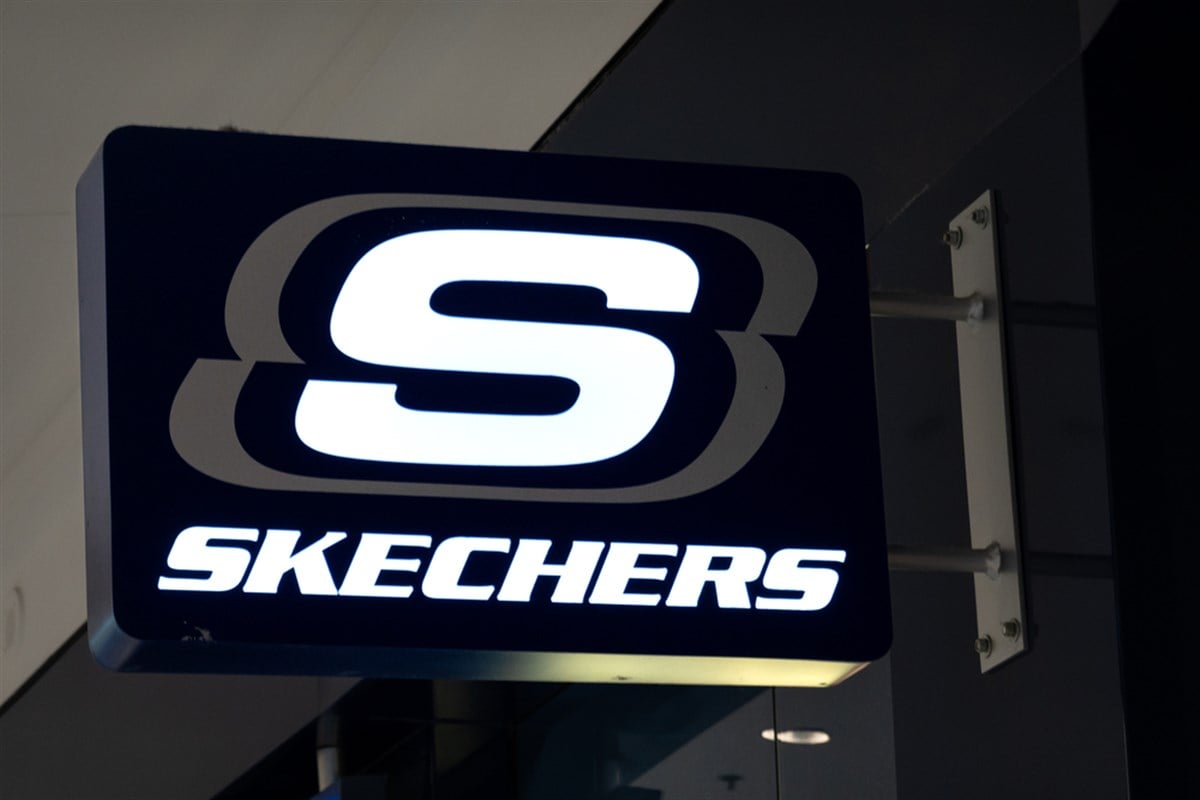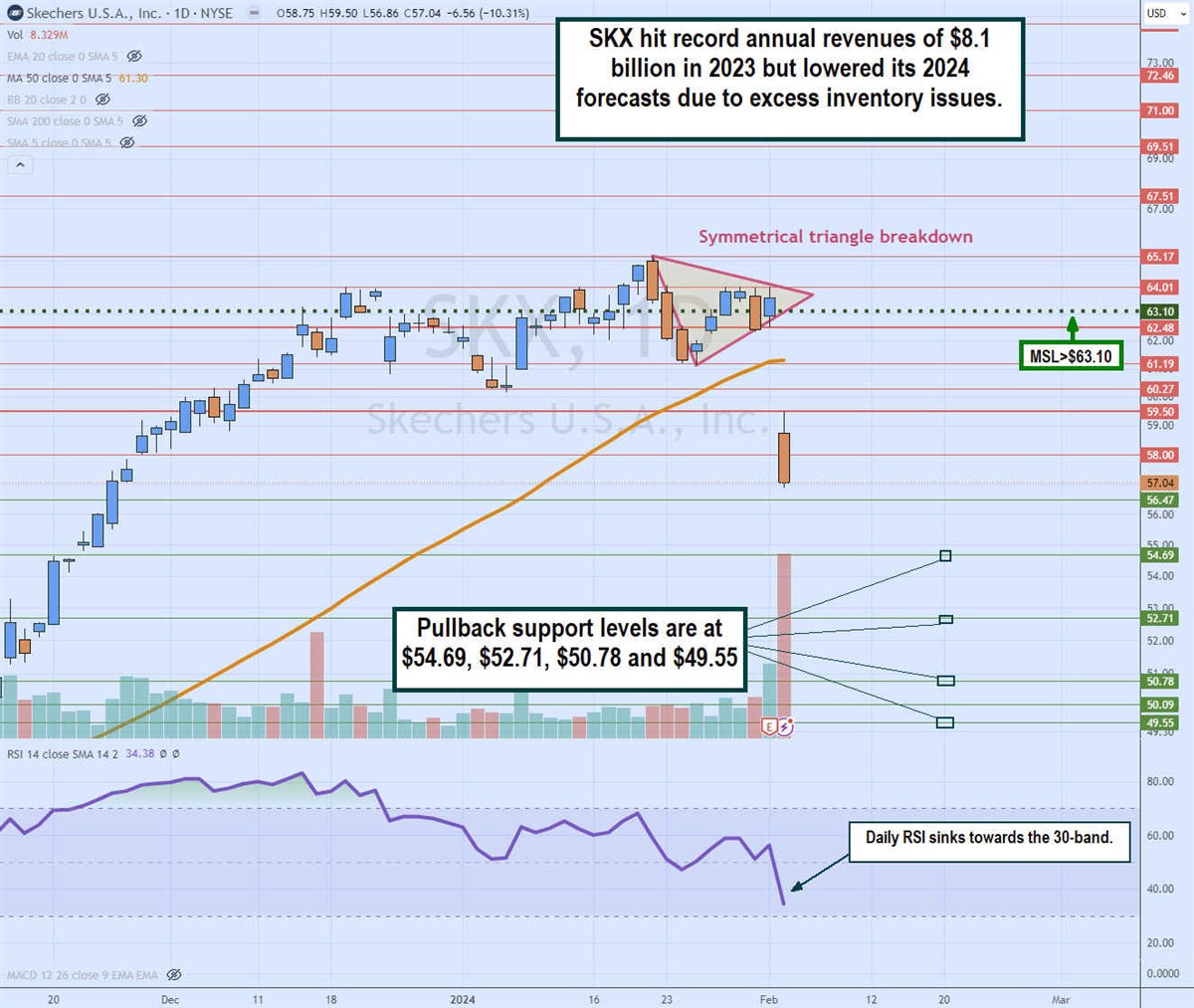
Skechers U.S.A. Inc. (NYSE: SKX) is a global lifestyle and performance NYSE: NKE">footwear and apparel company that has really hit its stride in the last decade. The company’s shares recently hit all-time highs at $65.17 on Jan. 22, 2024, and just reported record annual revenues topping $8 billion in 2023. The company has grown its Skechers-branded franchisee and third-party operated stores to 3,520 and over 1,400 company-owned NYSE: NKE">retail stores for a total of 5,168 Skechers retail stores worldwide.
Its company-owned digital and mobile e-commerce sites operate in over 24 markets. Unfortunately, the good news ends there as the company cut its earnings forecast, surprising investors and causing shares to sell off by 10%. The cause for concern is inventory bloat, again.
Inventory bloat is causing concern again.
The post-pandemic supply chain disruption caused apparel makers to overproduce merchandise to avoid future supply shocks. Unfortunately, this also led to rising inventories as consumers felt the pinch of inflation and cut back their discretionary spending, especially on apparel and NASDAQ: CROX">footwear. Bloated inventory calls for heavy promotions and discounting to move the merchandise. This leads to margin compression despite revenue growth.
Skechers CFO John Vandemore commented on its Q4 2023 conference call, “There were significant macroeconomic headwinds, including inflation and rising interest rates as well as wholesale challenges, particularly in the United States, largely stemming from inventory congestion.”
This was a problem with the retailers in the consumer discretionary sector throughout 2022 as things improved in 2023. However, it appears to be rearing its ugly head again. Investors are rightfully concerned whether this problem is company-specific or an industry issue that could affect other footwear and athletic apparel makes like Nike Inc. (NYSE: NKE), Crocs Inc. (NASDAQ: CROX), and Under Armour Inc. (NYSE: UAA), which also saw their shares sell off in sympathy. Check out the sector heatmap on MarketBeat.
Overstuffed
On Feb. 1, 2024, Skechers reported Q3 2023 EPS of 56 cents, beating consensus analyst estimates by a penny. Fourth-quarter revenues hit a record-growing 4.4% YoY, topping $1.96 billion, but they still fell short of consensus analyst estimates of $2.03 billion. Direct-to-consumer (DTC) sales rose 20.3%, while Wholesale saw an 8% decline as several retailers opted to manage conservative inventory levels. The company bought back $60 million of Class A common stock. Skechers ended the year with $1.39 billion in cash and cash equivalents.
Lowered guidance
Skechers lowered its Q1 2024 EPS guidance to $1.05 to $1.10 versus $1.20 consensus analyst estimates. Revenues are expected between $2.175 billion to $2.225 billion versus $2.19 billion analyst estimates. An EPS drop with rising revenues indicates margin compression from heavy discounting as a result of inventory bloat. For full-year 2024, Skechers expects EPS of $3.65 to $3.85 versus $4.18 consensus analyst estimates. Full-year revenues are expected to be between $8.60 billion and $8.80 billion versus $8.92 billion consensus estimates.
The silver lining
While the company cut guidance, opting to lean on the conservative side, Chief Operating Officer David Weinberg commented, "Our Wholesale business experienced a decrease in sales of 8%, as several retailers continued to manage their inventory levels conservatively. However, we are optimistic that this behavior is changing based upon early reads from January shipments and positive order trends for the first half of the year.”
Skechers lowered its domestic inventory levels by a third compared to the year-ago period. CFO Vandemore stated, “…we believe our current inventory levels are healthy and well positioned to support demand in early 2024.”
The company was able to hit gross margins of 51.9% for the year and continued to make progress towards double-digit operating margins, hitting 9.8%. Its DTC business was able to grow to over 50% of its total sales for the first time, growing to $998.3 million. DTC growth is indicative of consumer demand since it's coming straight from the consumers.
The company is also expanding its roster of elite-level athletes for its Skechers Performance lines, including NBA players Terance Mann and Julius Randall under its Skechers Basketball segment and Harry Kane, Europe's top goal scorer in 2023. Get AI-powered insights on MarketBeat.
Bolstering distribution to boost margins
Wholesale sales fell 10% domestically and 7% internationally. Conservatively managing inventory refers to taking products closer to the season; this refers mostly to domestic sales. There are shades of normalization. The main bottleneck is inventory congestion primarily in the Europe, Middle East and Africa (EMEA) regions, which was partially offset by the Asia-Pacific (APAC) region with double-digit improvements in China.
Skechers were able to cut inventory levels by 16% YoY as it began shipping from its new 600,000-square-foot facility in Mumbai. Its new distribution center in British Columbia will be its primary source of shipments for Canada, which will help to cut shipping costs and delivery times. Its new distribution center in Panama will come online in Q1 2024 to meaningfully increase South American capacity.
Skecher U.S.A. analyst ratings and price targets are at MarketBeat. Skechers peers and competitor stocks can be found with the MarketBeat stock screener.

Daily symmetrical triangle breakdown
The daily candlestick chart on SKX illustrates a symmetrical triangle breakdown pattern. SKX had previously run up to all-time highs at $65.17 before pulling back to the $61.19 bottom, where the ascending trendline commenced. The daily market structure low (MSL) triggered the bounce through $63.10, which was met with a lower high. SKX gapped down on its Q4 2023 earnings report, creating a gap channel between $62.48 and $59.50, completely ignoring the daily 50-period moving average at $61.30. The relative strength index (RSI) took a sharp fall under the 60-band. Pullback support levels are at $54.69, $52.71, $50.78 and $49.55.




